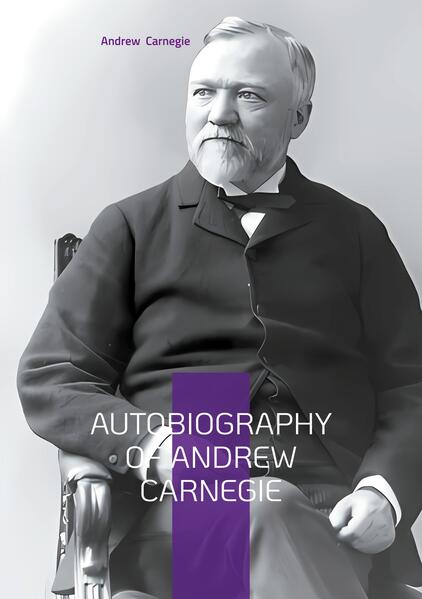
Zustellung: Do, 12.06. - Sa, 14.06.
Versand in 2 Tagen
VersandkostenfreiBestellen & in Filiale abholen:
"Autobiography of Andrew Carnegie" is a captivating journey through the life of one of America's most iconic industrialists and philanthropists. Born in 1835 in Dunfermline, Scotland, Carnegie's story epitomizes the quintessential rags-to-riches tale of the American Dream.
The narrative begins with Carnegie's humble beginnings in Scotland, where he was born into a working-class family. His early experiences, including his family's immigration to America when he was 13, shaped his worldview and instilled in him a strong work ethic. Carnegie vividly recounts his first job in a Pittsburgh cotton mill, working 12-hour days for a mere $1. 20 per week.
As readers delve into Carnegie's rise through the ranks of the business world, they witness his keen ability to recognize opportunities and his unwavering ambition. From his start as a telegraph operator to his ascent in the railroad industry, and finally to his dominance in the steel industry, Carnegie's journey is a masterclass in business acumen and strategic thinking.
The autobiography doesn't shy away from controversial topics, including the Homestead Strike, offering insights into the complex relationship between labor and management during the Industrial Revolution. Carnegie's philosophy on wealth, later known as the "Gospel of Wealth," is also explored, providing context to his later philanthropic endeavors.
This book is essential reading for those interested in business biographies, offering invaluable lessons in entrepreneurship and leadership. History enthusiasts will appreciate Carnegie's firsthand account of the Gilded Age, while readers of self-help literature will find inspiration in his self-made success story.
Carnegie's writing style is engaging and accessible, making this autobiography a compelling read for a wide audience. His reflections on success, wealth, and social responsibility remain relevant in today's business world, making this book a timeless piece of literature.
The narrative begins with Carnegie's humble beginnings in Scotland, where he was born into a working-class family. His early experiences, including his family's immigration to America when he was 13, shaped his worldview and instilled in him a strong work ethic. Carnegie vividly recounts his first job in a Pittsburgh cotton mill, working 12-hour days for a mere $1. 20 per week.
As readers delve into Carnegie's rise through the ranks of the business world, they witness his keen ability to recognize opportunities and his unwavering ambition. From his start as a telegraph operator to his ascent in the railroad industry, and finally to his dominance in the steel industry, Carnegie's journey is a masterclass in business acumen and strategic thinking.
The autobiography doesn't shy away from controversial topics, including the Homestead Strike, offering insights into the complex relationship between labor and management during the Industrial Revolution. Carnegie's philosophy on wealth, later known as the "Gospel of Wealth," is also explored, providing context to his later philanthropic endeavors.
This book is essential reading for those interested in business biographies, offering invaluable lessons in entrepreneurship and leadership. History enthusiasts will appreciate Carnegie's firsthand account of the Gilded Age, while readers of self-help literature will find inspiration in his self-made success story.
Carnegie's writing style is engaging and accessible, making this autobiography a compelling read for a wide audience. His reflections on success, wealth, and social responsibility remain relevant in today's business world, making this book a timeless piece of literature.
Produktdetails
Erscheinungsdatum
25. März 2025
Sprache
englisch
Auflage
1. Auflage
Seitenanzahl
224
Autor/Autorin
Andrew Carnegie
Verlag/Hersteller
Produktart
kartoniert
Gewicht
331 g
Größe (L/B/H)
210/148/16 mm
ISBN
9782322497485
Entdecken Sie mehr
Bewertungen
0 Bewertungen
Es wurden noch keine Bewertungen abgegeben. Schreiben Sie die erste Bewertung zu "Autobiography of Andrew Carnegie" und helfen Sie damit anderen bei der Kaufentscheidung.










